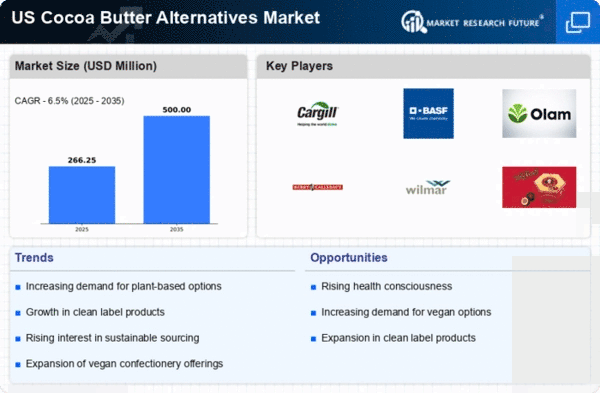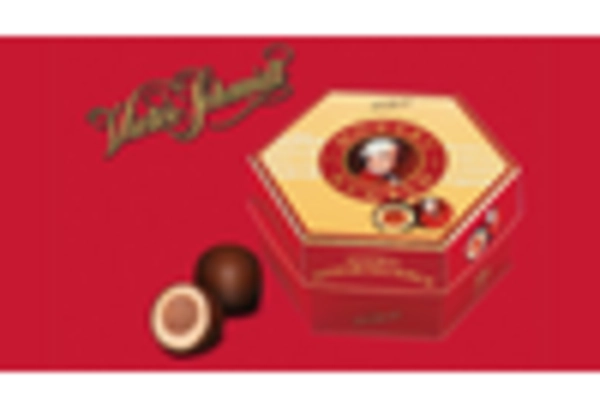Health Conscious Consumer Trends
The increasing awareness of health and wellness among consumers appears to be a significant driver for the cocoa butter-alternatives market. As individuals become more health-conscious, they tend to seek out products that offer lower saturated fat content and higher nutritional value. This shift in consumer behavior has led to a growing demand for plant-based fats and oils, which are perceived as healthier options. According to recent data, the market for plant-based food alternatives has seen a growth rate of approximately 27% annually in the US. This trend suggests that manufacturers in the cocoa butter-alternatives market are likely to innovate and develop products that cater to these health-oriented preferences, thereby expanding their market share.
Cost-Effectiveness of Alternatives
The cocoa butter-alternatives market is experiencing a notable shift due to the cost-effectiveness of alternative ingredients. Traditional cocoa butter can be relatively expensive, which may limit its use in various applications, particularly in the confectionery and cosmetic industries. In contrast, alternatives such as shea butter and palm oil derivatives often present a more affordable option for manufacturers. This economic advantage is particularly appealing in a competitive market where price sensitivity is prevalent. As a result, the adoption of these alternatives is likely to increase, potentially leading to a market growth rate of around 15% over the next few years. This trend indicates that cost considerations will continue to play a crucial role in shaping the cocoa butter-alternatives market.
Innovation in Culinary Applications
The culinary landscape in the US is evolving, with chefs and food manufacturers increasingly exploring innovative applications for cocoa butter-alternatives. This trend is driven by a desire to create unique flavor profiles and textures in various food products, including chocolates, baked goods, and spreads. The versatility of alternatives such as coconut oil and avocado oil allows for creative culinary experimentation, which is appealing to both professional chefs and home cooks. As the demand for diverse and unique food experiences grows, the cocoa butter-alternatives market is likely to expand, potentially achieving a growth rate of 12% in the coming years. This innovation-driven approach suggests that the market will continue to adapt to changing consumer preferences.
Sustainability Initiatives in Food Production
Sustainability initiatives are becoming increasingly prominent in the food production sector, influencing the cocoa butter-alternatives market. Consumers are more inclined to support brands that prioritize environmentally friendly practices, such as sourcing ingredients sustainably and reducing carbon footprints. This shift in consumer values is prompting manufacturers to adopt sustainable sourcing practices for cocoa butter alternatives, such as fair trade and organic certifications. As a result, the market is likely to see a rise in demand for sustainably produced alternatives, which could lead to a growth rate of around 18% over the next few years. This emphasis on sustainability indicates a broader trend towards responsible consumption that is reshaping the cocoa butter-alternatives market.
Regulatory Support for Alternative Ingredients
Regulatory frameworks in the US are increasingly supportive of the use of alternative ingredients in food and cosmetic products. The cocoa butter-alternatives market benefits from this trend, as regulatory bodies encourage the use of sustainable and non-GMO ingredients. This regulatory support not only facilitates the introduction of new products but also enhances consumer confidence in the safety and quality of these alternatives. For instance, the FDA has established guidelines that promote transparency in labeling, which is likely to boost the acceptance of cocoa butter alternatives among consumers. As a result, the market may witness a growth trajectory of approximately 10% as more companies align their product offerings with these regulatory standards.
















